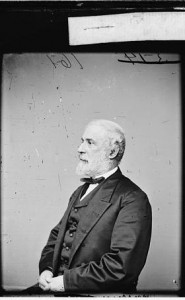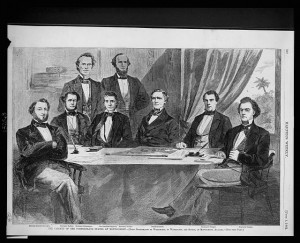LeRoy Pope Walker has stepped down as secretary of War in the CSA cabinet. A Richmond newspaper speculates on his possible replacement. Robert E.(Granny) Lee has been mentioned, although the Daily Dispatch thinks President Davis should try for more geographical balance in his cabinet by selecting someone from the Memphis area.
From the Richmond Daily Dispatch September 17, 1861:
Secretaryship of War.
–The Hon. L. Pope Walker, Secretary of War, has resigned that post. Who his successor will be is variously conjectured. There is a considerable outside pressure from Richmond circles in behalf of General Robert. E. Lee. Mention is also made of Major General Poln [Polk]. Still other names are prominently brought forward. Both in Great Britain and in this country the post of War Minister has always been regarded as one of those great political offices, requiring to be filled with some reference to public sentiment. We have no idea that President Davis will fill the appointment upon any other theory.–If this be the fact, then it would seem to follow as a matter of course, that if a proper man be found, the selection will be made from some State or great district of country not now represented in the Cabinet. In that event, the public will naturally expect that Tennessee, Arkansas, or at least the region of which Memphis is the centre and emporium, would be the one to furnish the new Cabinet officer. The Atlantic seaboard is now represented by Messrs. Hunter and Memminger; the Gulf States by Messrs. Mallory, Benjamin and Reagan; the great central country whose centre of intelligence, trade and interest is Memphis, is not represented in the Cabinet; and, upon abstract reasoning, would seem entitled to the appointment, provided it can furnish the qualifications and talents demanded.
Judging by our own feelings, we suppose the public to be profoundly indifferent as to the mere person to be selected. The first sentiment of the people is, that the highest talents at command should be enlisted for the post. The next feeling of the public is, that other things being equal, a just regard should be paid to the various geographical interests of the Confederacy.
In the retirement of Judge Walker, the country loses the services of an able, a valuable, and a most faithful public officer. All the circumstances attending the organization and administration of the affairs of the Department of War, have conspired to render the task an arduous and difficult one; and Judge Walker has this great fact for his personal felicitation, viz: that, in looking back upon his labors, no disaster has befallen the arms of the Confederacy during his tenure of office. The new machinery which he has had to create and set in motion; the new agents, unskilled in the service, to whom he has had to trust the management of its various duties, may have wrought awkwardly and without, efficiency, at times, and there may be room for much improvement in the service; but when we reflect that during the first seven months of the Confederate Government’s career, during which military operations on so large a seale have been conducted, and engagements so repeated and numerous on so many distant theatres have occurred without a single disaster to the Confederate arms, we are bound to concede to Judge Walker the highest meed of praise to a Cabinet officer, that of ability, fidelity, and success.–True, there was a disaster which befell our arms under Gen. Garnett; but this was at a very early date after the Confederate Government took charge of operations in this quarter, and before it had time, while a great danger threatened them from the direction of Washington, to mature its preparations in that distant theatre of hostilities. The affair of Fort Hatteras was one of which the State of North Carolina had control, and for which the Confederate Government was not responsible.
The President has manifested his high sense of the abilities and services of Judge Walker by tendering a Brigadier-Generalship in the Confederate service. The country thus still retains the services of Gen. Walker. We have no doubt that the change from the Cabinet to the field will be extremely agreeable to the feelings of this officer.
The pleasures of political speculation haven’t changed much in 150 years. I think it would have been pretty nice if General (Bishop) Polk was selected – an ideal person to start each cabinet meeting with prayer.
How would have the war been different if Lee was the Secretary of the department?
As it turned out the perpetually smilingJudah P. Benjamin would serve as War secretary until March, 1862. Benjamin’s replacement as Attorney General was not from Memphis. Thomas Bragg was an ex-governor of North Carolina and the older brother of General Braxton Bragg.


